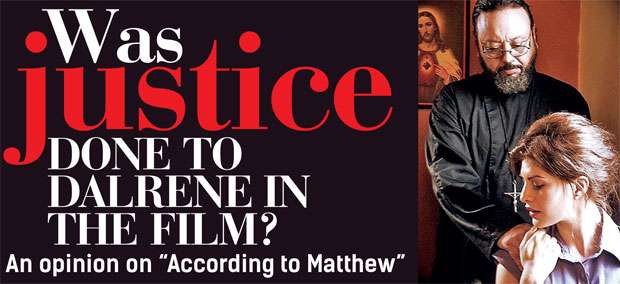16 Jan 2019 - {{hitsCtrl.values.hits}}

Was Dalrene Ingram guilty of killing her husband? Was she aware of Mathew Peiris’ criminal designs and the method of killing he carried out? Did she respond to his advances while her husband was still living?
The continuous stream of film goers heading to cinema halls to see “According to Matthew” seeks answers to many doubts that cloud their minds. Curiosity seems to have returned even after several decades, just as in the aftermath of the crime. The filmmaker Chandran Rutnam may argue that it was not an Agatha Christie detective to provide answers, and that his job was not to exonerate anybody or pin the guilt, but to stick to facts. “According to Matthew” however, is based on a true story that rocked Colombo in the late 1970s. Therefore, instead of going by the premise that Dalrene too was found guilty by a court of law and received the death penalty, it is only fair that the filmmaker gives a realistic portrayal of her and treated the role with understanding and sensitivity. For the reason that Dalrene was the motive of the double murder, could she be made a partner to the crime?
detective to provide answers, and that his job was not to exonerate anybody or pin the guilt, but to stick to facts. “According to Matthew” however, is based on a true story that rocked Colombo in the late 1970s. Therefore, instead of going by the premise that Dalrene too was found guilty by a court of law and received the death penalty, it is only fair that the filmmaker gives a realistic portrayal of her and treated the role with understanding and sensitivity. For the reason that Dalrene was the motive of the double murder, could she be made a partner to the crime?
In several interviews given by the filmmaker, he had mentioned that the court found Dalrene guilty, along with Fr. Mathew, and both were given the death sentence by hanging. But with Fr. Mathew getting the same lawyer appearing for him to defend Dalrene, couldn’t she have been handicapped? Because, her own defence could not have been independent of the co-accused, even if the lawyer believed that Dalrene had no part to play in the double murder.
When she made a separate appeal in defence of her, she was acquitted on circumstantial evidence, a section which was not included in the film. Therefore, the acquittal of Dalrene as the filmmaker says, was not political, but legal. Fr. Mathew on the other hand, on the appeal he made, had his death penalty commuted to life imprisonment. On good behaviour in prison, he was freed in the winter of his life.
While the prime task of the lawyer was to defend the murderer, the fact that Dalrene could not get a lawyer to independently defend herself, showed the extent of her vulnerability. And this she did at the risk of being declared guilty. She was not only found guilty, but received the death penalty by hanging, the same as that of the murderer.
Film maker Rutnum says :“Ingram too has to take the blame for the double homicide. She was found guilty by a court of law. Both were condemned to death by hanging. The courts heard the evidence and convicted her. Her getting out later was a political thing......”.
“And a woman has to seduce a man. A man has to seduce a woman. Otherwise, it is called rape.....”
How fair is this judgement of the filmmaker?
So, Jacqueline Fernandez, who acts as Dalrene, plays the role of a glamorous, seductress. And it appears quite natural for a charismatic, good-looking priest, acted by Alston Koch, who looks too decent for the role, to make advances to her, receiving a response and being driven to commit double murder. The murder story (of a double murder or treble?) enacted in a vicarage and committed using an unsuspecting method by a man in robes, has all the elements that appeal to a foreign audience. But in Sri Lanka, this was a calculated, cold-blooded murder that took place almost in our neighbourhood, and sent shockwaves through Colombo. Therefore, it cannot be helped if Sri Lankans take a personal interest in the film and are excessively critical of the film.
Dalrene was in reality, a poor, plain, hardly educated Burgher girl. Fr. Mathew, about 20-30 years older than Dalrene, was a vicious but forceful character. He was dark, gangly with a long grey, unkempt beard. Identified as an exorcist, it is said that he was uncouth and unhygienic, apart from being a pervert which had caused many ugly incidents in the church. His reputation therefore, may not have been a secret in the vicarage and may not have escaped Dalrene who happened to live in the same premises. Therefore, was there a lustful alliance between the two and did their relationship come about that easily?
In “According to Matthew” on the contrary, no sooner Fr. Mathew tells Dalrene of his wife’s death, she is made to utter the words “then we can marry?” If Jacqueline, instead of playing a servile, robotic role, was given to bring out the mental strains, the psychological battle Dalrene may have fought, the pressures she faced from the outside world and her reactions of being a condemned woman, it would have been an enviable role for Jacqueline that rarely comes in the way of actors.
There still are many questions that have gone unanswered. If Dalrene heard about Fr. Mathew’s perversions on young girls during the performing of exorcism, did she turn a blind eye to them because of her helplessness and had nowhere to go? And was it fear of the priest that prevented her from reacting when there was a delay in calling for medical attention for the husband in spite of the fact that Ingram’s parents made strong protests?
Incidentally, it was interesting to find fellow journalist Gaston De Rosayro playing a role in “According to Matthew” and many other well known people appearing on the screen performing what they actually did at the time. The film however, very dramatically covered only up to the point the court delivered the death penalty to the main characters, and the two being taken to prisons. There was disappointment that no mention was made in the film of their final legal status quo and of the excommunication of Fr. Mathew by the Anglican Church which would have been important for those of the church.
30 Nov 2024 1 hours ago
30 Nov 2024 4 hours ago
30 Nov 2024 6 hours ago
30 Nov 2024 7 hours ago
29 Nov 2024 29 Nov 2024